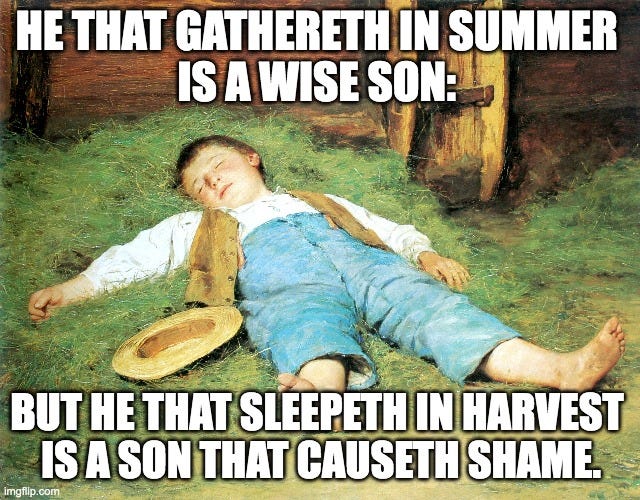This post is a continuation of the ‘Pizza and Sushi’ series that I am having with
, but in it I am specifically responding to a comment by .”The difference is that those things are observable; the definition of morality is not. Morality does not declare something to be of a particular weight or size - it is inherently a value judgment. The difference that I think you should be arguing is relative morality vs. absolute morality. Relative morality is the opinion of human beings, and especially a human consensus. In this is very much resembles ideas like pineapple pizza: most people are horrified, but their main argument seems to be one of preference, and their main tactic is shaming dissenters.
Now, before I can address the issues I see in this quote, I will have to clarify a couple of things.
The LORD will not suffer the soul of the righteous to famish: but he casteth away the substance of the wicked.
Proverbs 10:3
Observable means Measurable
I think that what Russ means by ‘observable’ is ‘measurable’ here. I think that what he is saying is that we cannot measure how moral, or immoral, a given person or society is and the results that morality has on him, his family, his subculture, and his nation. Indeed, on the world. That is, I believe, what he thinks separates it from weight or height. A man may be six feet tall, and he may be a good father, but we have no ruler for ‘father’, whereas we do have one for height.
Definitions are not Measurable.
The next thing that I need to point out is, no doubt, a silly quibble. I don’t think he really meant to compare a particular height versus the definition of morality. If we are going to talk about definitions, then no one definition is any more measurable than another. You can’t measure the definition of math, physics, morality, or pizza.
MORAL'ITY, noun The doctrine or system of moral duties, or the duties of men in their social character; ethics.
The system of morality to be gathered from the writings of ancient sages, falls very short of that delivered in the gospel.
1. The practice of the moral duties; virtue. We often admire the politeness of men whose morality we question.
2. The quality of an action which renders it good; the conformity of an act to the divine law, or to the principles of rectitude. This conformity implies that the act must be performed by a free agent, and from a motive of obedience to the divine will. This is the strict theological and scriptural sense of morality But we often apply the word to actions which accord with justice and human laws, without reference to the motives form which they proceed.
…unless we are looking at the Webster’s Dictionary and counting the number of words that it uses. In which case, all definitions are equally measurable. So, what I think he is saying is that a given height is measurable, and a given moral action is not. But that premise is simply false. You can measure morality.
Confounding Factors
It is certainly hard, however. One issue that the moral measurer faces is the huge number of confounding factors. A seemingly infinite number of them.
Morality is not a simple subject. Even if we were to merely go with the two greatest commandments, there is a lot of depth of meaning to loving God and loving our neighbour. Being a good father, a morally good father, sounds simple, but it involves hundreds, if not thousands, of decisions every day.
Making good sushi is difficult. It involves all sorts of decisions as to what kind of rice, how to cook it, what kind of ingredients, and how much of each of them. But compared to morality, all of cooking is a walk in the park as a two-year-old.
Not just Cause but Effect
And the confounding factors are not just in the causes but in the effects. We are not at some cooking show, with three judges and an audience to please. Our moral or immoral actions affect ourselves and others in thousands of ways every day.
The Wrong Right
I read a study a few years ago that proposed to measure ‘the influence of prayer’. And if it hadn’t been proposed as a serious study, I would have laughed. (I might have laughed anyway; I don’t remember.) Because, you see, they made no distinction whatsoever between the kind of prayer!
Anyone who has read the Old Testament will understand the folly of this. We all remember the story of Elijah and the prophets of Ba’al. If there is a story that illustrates the power of prayer, that would be it, eh?
But not to our statistician, I imagine. The one (albeit dramatic) response to the single prayer of the one prayer warrior would surely have gotten lost (been rendered statistically insignificant) in the mass of the hours of prayer by all of the other people! I mean, four hundred fifty prophets, praying from morning to evening… let’s call it eight hours… or let us call it 480 minutes… that’s 216,000 man/minutes of prayer! Add in the one minute of prayer from Elijah, and you have one (possibly exaggerated or even apocryphal) report of answered prayer per 216,001 prophet/minutes of prayer! That’s .0005% chance of getting an answer to prayer! That’s just a measurement error!
In other words, if you wish to measure morality, you have to actually get it right. You cannot just say ‘prayer’; you would have to be talking about the right kind of prayer, to the right god, for the right reasons, in the right way…
Or if you are going to measure ‘kindness’ you would have to make sure that the action was actually kind… not that it merely sounded kind to you, according to your views.1
Pro 10:30 The righteous shall never be removed: but the wicked shall not inhabit the earth.
At What Level?
By its nature, morality is a hard study because it doesn’t just operate on one level. Physicists should be familiar with this issue. I read a definition of gravity the other day that, after acknowledging that it held the entire universe together, stated that it was so weak it did little to nothing at the subatomic level.
Morality operates at all levels of human society: from the individual, to the family, to the church, to the village, to the country, to the world, and down through history. A butterfly might wave its wings and change the weather; so can a moral decision echo down through time and across cultures. Or an individual. What if Ghengis Kahn or Stalin had not survived childhood? Or if their father had raised them better?
Honour Your Father
But even with all that, we can still see some pretty powerful evidence of the effects of morality. Let me bring forward my first example: Fatherhood.
The Christian faith (and it is not alone) puts a rather dramatic premium on the father. The husband of the mother, the one who planted the seed, married the mother (before they had sex), stays in the house and helps raise the children. Is the spiritual head of the home,2 has obedient children,3 and whose influence echoes down generations.4 It frowns on divorce, concubinage, unmarried mothers, etc etc.
That is the ‘morality’ that the Christian faith teaches in its founding documents (the Old and New Testaments) and a reasonably consistent witness throughout the years… at times emphasising one aspect, at times another, at times falling down, at times rising up. Most of the church is pretty wimpy and has fallen right now on these issues.
In the very crudest way, we could attempt to measure the effect of this morality by examining the difference between homes with fathers in them and homes without. In the very crudest way… as many homes with fathers in them may have fathers who do not even attempt to teach ‘honour thy father’, and still others with children who do not dream of obeying that precept.
But at the very least the high moral priority placed on fathers will be crudely tested, along with the precept ‘honour thy father’ (since one cannot easily honour an absent father), by looking at the results of fatherless households.
Now some may object that it isn’t someone or other’s fault that the household is without a father. But measurements do not depend upon ‘fault’. It is not anyone’s fault that a given branch breaks, we can still measure the speed of its fall, and the resulting destruction. Like the falling limb, a falling rate of homes with fathers in them will produce devastating results.
And make no mistake, those results are devastating. Children growing up in fatherless homes have far worse results in at least the following areas: Poverty, Drug and Alcohol Abuse, Physical and Emotional Health, suicide, Educational Achievement, Crime, Sexual Activity and Teen Pregnancy.5
Male and Female
From the Old Testament to the New, Scripture is chock full of distinctions between men and women, and laws regarding what their relationships are supposed to look like.
So God created man in his own image, in the image of God created he him; male and female created he them.
Genesis 1:27
But from the beginning of the creation God made them male and female.
Mark 10:6
When a man hath taken a wife, and married her, and it come to pass that she find no favour in his eyes,
because he hath found some uncleanness in her:
then let him write her a bill of divorcement, and give it in her hand, and send her out of his house.
Deuteronomy 24:1
For this cause shall a man leave his father and mother, and cleave to his wife; And they twain shall be one flesh: so then they are no more twain, but one flesh.
What therefore God hath joined together, let not man put asunder.
Mark 10:7-9
And Adam called his wife's name Eve; because she was the mother of all living.
Genesis 3:20
I will therefore that the younger women marry, bear children, guide the house, give none occasion to the adversary to speak reproachfully.
I Timothy 5:14
And Adam said, This is now bone of my bones, and flesh of my flesh: she shall be called Woman, because she was taken out of Man.
Genesis 2:23
For Adam was first formed, then Eve.
I Timothy 2:13
And all throughout history, men and women, cultures and nations, have rebelled against these distinctions and relationships. In our age, feminism, no-fault divorce, and transgenderism are particular but not isolated examples.
And the results are catastrophic. Our societies have plummeting birth rates: they are literally committing cultural suicide. They have mounting divorce rates and ever-increasing numbers of black-pilled or others who either don’t manage to marry or marry later.
In our current age we are literally castrating our boys and cutting the breasts off our girls.
So, while it is not easy to always make a one-to-one link between the exact moral failing and the exact results, I don’t think the links in these cases are even close to deniable by anyone with a shred of honesty.
Conclusion: A Pound of Pizza
The fields of physics, mathematics, engineering, and biology… to name a few… include some fantastically difficult subjects of study. For every doctor that you find who advises you to drink milk, you can find one that thinks it is the next best thing to poison. And as we all know, if you wanted to do a study of the effects of drinking milk , you have need to control for how much your study subjects smoked, how many calories they got otherwise, and whether they take their vitamins or do their exercises.
Moral behaviour is the same, only more so. If we spent millions of dollars on a study of diet we might be able to try to measure the complete input (and output) of thousands of test subjects, how much they exercised, what kind of work they did… and then measure their weight gain or loss, their blood pressure, their ability to run the mile or work out math problems along the way.
But billions of dollars would not even come close for us to measure their moral or immoral behaviour. Their thoughts, dreams, aspirations, interactions with their spouses, children, employers, pastors… and other billions would not suffice for us to measure the results upon themselves, their society, their nation, and the world.
If I came home to my wife and told her that I had eaten a pound of pizza, she would still have to ask some questions to truly understand my feat, and guess at its results. Was it cheese pizza or Supreme? Did it come from the place with the stuffed crust? Was it deep dish or thin? Did I eat it all at once or over a couple of hours? And did I take my digestive pills afterwards? The amount of heartburn I was going to have would depend upon these and other factors.
If I preached a sermon entitled ‘Honour your Father’ (which I have done. Or come close anyway. I think I called it ‘Respect your Elders’.), and you wished to know what effects this sermon had upon… whoever it had it upon… you are in a worse position than my wife. You would not only need to know what the text of my sermon was, who I preached it to… and what they did with it. And you would have to understand the entire culture that they are in, what their children are being taught in school and what the parents are being exposed to on TV or at work.
It would be an extremely complex study. And in order to get the full picture vis a vis morality, you would also have to add in, or control for, all of the hundreds of other moral/immoral behaviours.
And then to measure the result of my preaching, you wouldn’t just wonder if I got heartburn, but what the murder rate would be, what the divorce rate, the use of prostitution and the amount of church attendance.
Morality is an exceedingly complex subject with exceedingly complex results. But that doesn’t mean we don’t see its effects every day. All day.
Thank you for reading Von’s Substack. I would love it if you commented! I love hearing from readers, especially critical comments. I would love to start more letter exchanges, so if there’s a subject you’re interested in, get writing and tag me!
Being ‘restacked’ and mentioned in ‘notes’ is very important for lesser-known stacks so… feel free! I’m semi-retired and write as a ministry (and for fun) so you don’t need to feel guilty you aren’t paying for anything, but if you enjoy my writing (even if you dramatically disagree with it), then restack, please! Or mention me in one of your own posts.
If I don’t write you back it is almost certain that I didn’t see it, so please feel free to comment and link to your post. Or if you just think I would be interested in your post!
Thanks again, God Bless, Soli Deo gloria,
Von
Links
A Piece of Pi
Defining Pi I once heard a story, which may well be apocryphal, about a politician who decided that they should pass a law setting pi to 3. It would be much easier on everyone, his reasoning went. It would be so much easier to multiply numbers by ‘3’ than by the infinitely long number ‘3.14…’.
The knowledge of Pizza, Defintion of Sushi, and Existence of Food
·
NOV 16
Pizza, Sushi, and the Definition of Morality
·
OCT 31
Sushi, Pizza, and the Existence of God
·
OCT 24
Ground Rules
·
AUG 9
Quote, Misquote, and Steelman
·
NOV 14
Steelmen and Inconsistencies
·
AUG 2
On colour, colour vision, and breastfeeding
·
JUL 14
And you have to measure what you say you are going to measure. I read another study that proposed to measure the quip, “The Family the prays together, stays together.” They measured lots of things… church attendance, etc. But they didn’t actually measure whether the family… prayed together.
See Ephesians 5
See Ephesians 6
See Jeremiah 35
https://fathers.com/the-consequences-of-fatherlessness/




















>>And you also appear to be assuming that lots of individuals all making their own judgements would somehow be more just. Why would that be?
No, not quite. What Christian doctrine (and military doctrine, actually) teaches is that there are times when the individual needs to take responsibility for their own action, and is not allowed to follow a leader who is actively asking them to go against God's Law (or military law, etc.). This is actually a pretty common doctrine... maybe it comes from Christianity. "I was just following orders" is a known no-no.
Sin can happen at the individual, family, church, or national level (and business, etc. Any level. Any group. A chess club.). Sin needs to be resisted at every level. See: The Doctrine of the Lesser Magistrate. https://en.wikipedia.org/wiki/Lesser_magistrate
Dan 3:16 Shadrach, Meshach, and Abednego, answered and said to the king, O Nebuchadnezzar, we are not careful to answer thee in this matter.
Dan 3:17 If it be so, our God whom we serve is able to deliver us from the burning fiery furnace, and he will deliver us out of thine hand, O king.
Dan 3:18 But if not, be it known unto thee, O king, that we will not serve thy gods, nor worship the golden image which thou hast set up.
It took me five minutes to find this post and figure out what question. Assuming it is this one:
>>>> Are you saying that every Christian interprets everything the same as every other Christian? If not, how can two who understand an issue differently possibly be both obeying G-d?
Answer: They can't. I would add an exegisis of Romans 14 in here, but maybe later. For now I would add... When a human court orders you to do something that is clearly in violation of God's Law, will you be obeying God if you disobey His law because they told you to?
Answer: No.
It is a known doctrine that different understandings (usually because of the perversion of sin. No, I would be willing to say always because of the perversion of sin. Big thing, sin.) will lead to different actions, some of which will be therefore wrong and against the will of God. However these understanding can happen at any level: the individual, the family, the church, and the nation. At each of these levels someone can misunderstand or even deliberately disobey God. At each of those levels those obeying them could find themselves in the position of saying, "But if..."
Dan 3:18 But if not, be it known unto thee, O king, that we will not serve thy gods, nor worship the golden image which thou hast set up.